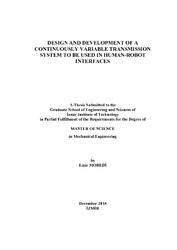Please use this identifier to cite or link to this item:
https://hdl.handle.net/11147/7173Full metadata record
| DC Field | Value | Language |
|---|---|---|
| dc.contributor.advisor | Dede, Mehmet İsmet Can | - |
| dc.contributor.author | Mobedi, Emir | - |
| dc.date.accessioned | 2019-07-12T12:48:40Z | |
| dc.date.available | 2019-07-12T12:48:40Z | |
| dc.date.issued | 2018-12 | - |
| dc.identifier.citation | Mobedi, E. (2018). Design and development of a continuously variable transmission system to be used in human-robot interfaces. Unpublished master's thesis, İzmir Institute of Technology, İzmir, Turkey | en_US |
| dc.identifier.uri | https://hdl.handle.net/11147/7173 | - |
| dc.description | Thesis (Master)--Izmir Institute of Technology, Mechanical Engineering, Izmir, 2018 | en_US |
| dc.description | Includes bibliographical references (leaves: 111-113) | en_US |
| dc.description | Text in English; Abstract: Turkish and English | en_US |
| dc.description.abstract | Continuously Variable Transmission (CVT) systems are being used for many applications such as automotive transmissions, robotics, and aerospace. In an ideal condition, these systems have the potential to provide continuously varying power transmission within a predefined limit. This transmission is accomplished with the help of friction, belt or gear systems. CVT can find application in a human-robot interface if a set of design criteria including backdrivability, independent output position and stiffness variation, shock absorbing and low mass and inertia can be satisfied. Even if there are various CVT designs in the literature for human-robot interfaces, the primary limitation of the two-cone drive CVT designs is that the output torque and the output position cannot be altered independently. Considering the friction drive CVT designs, the reason for this problem is that the friction wheel, which is designed to transmit the torque from the input cone to the output cone, gives rise to remarkable longitudinal friction force along the linear way. In order to overcome this problem, a sphere is used in the work presented in this thesis for the CVT design as the transmission element. In addition, it is stated in the literature that common CVT drive systems do not have the capability to be used in cyclic bidirectional motion. In the presented CVT design, a second sphere is added to the system with two springs from the lower part of the cones for pre-tension in order to solve the bidirectional transmission problem. Additionally, an adjustment of the normal force applied on the cones is designed in order to regulate the shock absorption limitations. | en_US |
| dc.description.abstract | Sürekli değişken aktarma (SDA) sistemleri otomotiv şanzımanlarında, robotik ve havacılık gibi bir çok uygulamada kullanılmaktadır. Bu sistemler teorik olarak belirli bir sınır arasında güç aktarımını kademesiz olarak değiştirebilmektedir. Söz konusu aktarma; kayış, zincir veya kuru sürtünme ile sağlanmaktadır. SDA sistemleri; geri sürülebilirlik, konumun ve direngenliğin bağımsız olarak kontrol edilebilmesi, ani fiziksel çarpışmaların sönümlenebilmesi ve düşük ataletsel özelliklere sahip olma gibi kriterlerin sağlanabildiği durumda, insan-robot ara yüzlerindeki uygulamalarda yer bulabilir. Literatürde insan-robot ara yüzlerinde kullanılması için tasarlanan çeşitli SDA sistemleri bulunsa da, iki koni ile oluşturulan SDA tasarımlarının temel kısıtlaması, çıkış konumunun ve çıkış torkunun bağımsız olarak değiştirilememesidir. Kuru sürtünme prensibi ile oluşturulan SDA sistemleri göz önüne alındığında, bahsi geçen problemin sebebi şudur: giriş konisinden çıkış konisine aktarmayı sağlayan sürtünme tekerleği önemli derecede boylamsal yönde sürtünme kuvvetine yol açmaktadır. Bu meselenin çözümlenmesi için, aktarmayı sağlayan eleman olarak bir küre kullanılmıştır. Ayrıca, yayın taramasında rastlanan bir başka problem de şudur: iki koni ile oluşturulan SDA sistemleri periyodik olarak iki yönde (saat yönü ve saatin tersi yönü) çıkış konumunu değiştirebilme kabiliyetine sahip değildir. Bu tezde sunulan özgün SDA sisteminde söz konusu problemin çözümüne yönelik olarak ikinci küre sisteme konilerin alt kısmından ön gerilmeli yaylar ile birlikte eklenmiştir. Bunlara ek olarak, koninin yüzeyine uygulanan normal kuvvetin ayarlanması sağlanarak şok sönümleme sınırlarının düzenlenmesi sağlanmıştır. | en_US |
| dc.description.sponsorship | The Scientific and Technological Research Council of Turkey via grant number 117M405 | en_US |
| dc.format.extent | xiii, 113 leaves | - |
| dc.language.iso | en | en_US |
| dc.publisher | Izmir Institute of Technology | en_US |
| dc.rights | info:eu-repo/semantics/openAccess | en_US |
| dc.subject | Flexible robot arm | en_US |
| dc.subject | Power transmission | en_US |
| dc.subject | Continuously variable transmission | en_US |
| dc.subject | Human-robot interface | en_US |
| dc.subject | Haptics | en_US |
| dc.title | Design and Development of a Continuously Variable Transmission System To Be Used in Human-Robot Interfaces | en_US |
| dc.title.alternative | İnsan-robot Arayüzlerinde Kullanılması için Bir Sürekli Değişken Aktarma Sistemi Tasarımı ve Geliştirilmesi | en_US |
| dc.type | Master Thesis | en_US |
| dc.institutionauthor | Mobedi, Emir | - |
| dc.department | Thesis (Master)--İzmir Institute of Technology, Mechanical Engineering | en_US |
| dc.relation.tubitak | info:eu-repo/grantAgreement/TUBITAK/MAG/117M405 | - |
| dc.relation.publicationcategory | Tez | en_US |
| dc.identifier.wosquality | N/A | - |
| dc.identifier.scopusquality | N/A | - |
| item.openairecristype | http://purl.org/coar/resource_type/c_18cf | - |
| item.openairetype | Master Thesis | - |
| item.languageiso639-1 | en | - |
| item.cerifentitytype | Publications | - |
| item.grantfulltext | open | - |
| item.fulltext | With Fulltext | - |
| Appears in Collections: | Master Degree / Yüksek Lisans Tezleri | |
Files in This Item:
| File | Description | Size | Format | |
|---|---|---|---|---|
| T001851.pdf | MasterThesis | 12.14 MB | Adobe PDF |  View/Open |
CORE Recommender
Page view(s)
352
checked on Apr 28, 2025
Download(s)
188
checked on Apr 28, 2025
Google ScholarTM
Check
Items in GCRIS Repository are protected by copyright, with all rights reserved, unless otherwise indicated.